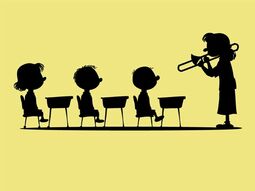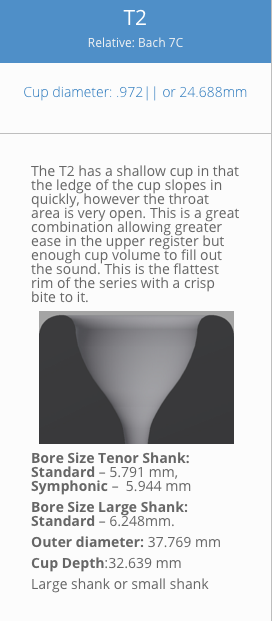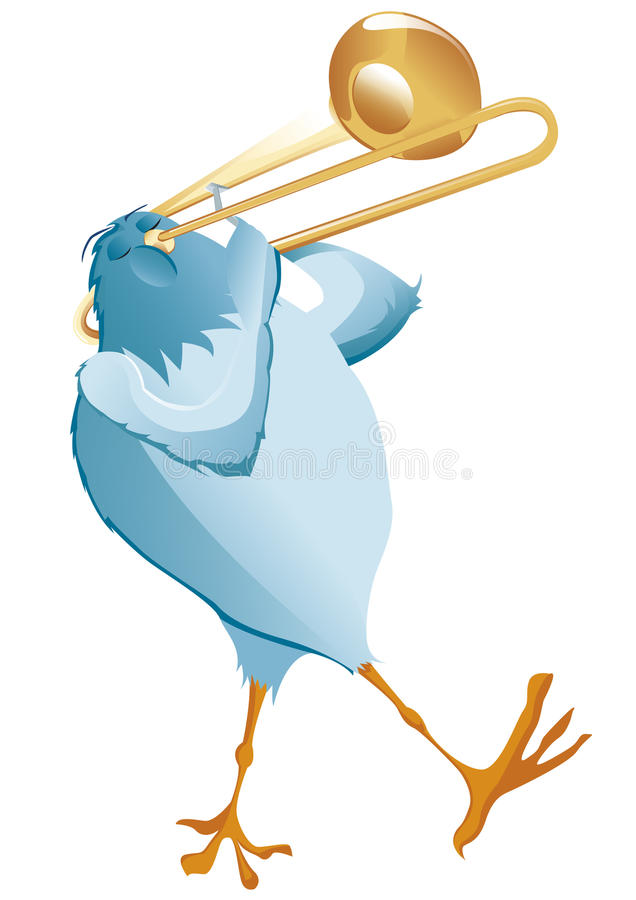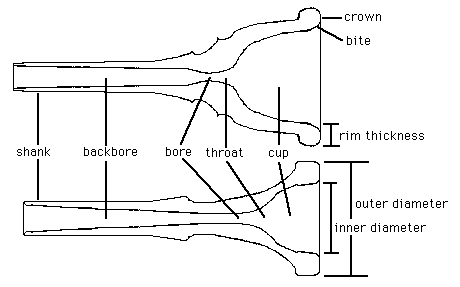My thoughts
Musicians teaching their kids. To push down that road or not? #career #music #lifebalance #happiness1/24/2019  I often wonder if I am giving enough of myself to my kids. Sure, I am a loving and caring Dad, but as a musician do I have an obligation to pass on my craft? We started our kids in piano lessons and have had varying degrees of success, but I have not really dug down and really tried to motivate my kids in music. Is it enough to lead by example, practicing, gigging and such? I am a trombonist by trade and shoot, my son is in fourth grade and I have not really pushed him towards any sort of wind instrument. Maybe that is a blessing, as music shouldn't be something that you have to do, but something you want to do. I am torn, as I am proud that I have not pushed my kids in the direction I want them to go, but maybe a little encouragement in the areas that I am skilled would be helpful. Well, that is parenting for you. Learn as you go. Well, to end this blurb, I will say that I will start giving my son and daughters more opportunities to try different instruments and see where their interest takes them.
0 Comments
 It has been a while since I blogged. I could not stay silent on this one. I am noticing at my children's elementary school that at the Christmas concert, everyone is singing along to a prerecorded track - lipsyncing. To their credit, the teachers did lower the volume on the track so that you could actually hear the children singing this year, a nice touch. However, are we so far gone that we will not risk our children singing Christmas songs to their parents? What does this teach the children? The message to me is that this is live performance, where the actions on stage trump any musicality. And, the choreographed moves on stage or simple, goofy and hastily put together - but the audience eats it up. Why not? We have all been programmed that the visual aspect of the show is paramount. Everyone loves to see their Johnnys or Sallys struggling to march in-step to the beat while they do their best Brittany Spears impression. And, worst, the children think this is music: singing along to someone else belting out the exact same part - and I am not talking about beautiful, balanced, in-tone monophony that you would find in a choir. Well enough of that rant. If you have read this far, you either agree or are just puzzled. Had some great advice between sets last night. For those of us you have performance anxiety on the band stand (and there are a lot of us), it is good to keep in mind that it is not any single number or night that defines us as musicians, but our reputation over time. I have spoken before about how the audience can be forgiving. Likewise, your fellow musicians can be understanding, if you have a good track record. If you miss a note or under perform, here and there, is not as big a deal as how you perform generally, and people will remember your overall competence. So take that breath and let your true ability shine through.
Found out recently that mouthpieces really do affect intonation. If you browse the internet, you will get some general information that shallow mouthpieces make you sharper and deeper mouthpieces make you flatter. This is logical to me, as a shallow mouthpiece means that there is less room for the air to travel to get to the horn, i.e., the horn is essentially shorter and therefore, of a higher pitch. However, I think there is more to it than that. As I play around with various mouthpieces and the overtone series on the trombone, some mouthpieces are just a better match for me, intonation wise. This is not something that you think to try at the store when you are testing out the mouthpiece (at least I did not think to do it), i.e., use a tuner with the new mouthpiece (& horn) and see if you are playing any differently with the new equipment. I would recommend doing this, as I found that the mouthpiece that felt and sounded pleasing messed with my intonation. It is a lot of work to get your intonation back in line, so it is something to consider before making a major change in your equipment.
If you are getting frustrated with a task you are practicing, leave it and come back. In the interim, your brain will be digesting and organising the information you have given it. When you come back, you may be surprised at your improvement. Not only are you refreshed, but your brain has been working subconsciously on the information while you were doing another task. That task can be another related task or something completely different. So, it is actually better to "interleave" your learning and not take any exercise to full completion. Move back and forth between activities and harness the power of interleaving. And no, this is not multi-tasking. Stay away from that. It has been proven to minimise your effectiveness is all activities.
When does a fine selection of mouthpieces become a problem . . . maybe mouthpiecepurchaseanosis. Next thing you know, you have mouthpieces holding newly cut flowers, displayed throughout the house. I'm not sure. I think the quest for the perfect mouthpiece can be all-consuming and at some point, you must say, "This is pretty good, let's get to work." I only bring up this topic because I was kidding with my trumpet section last night, saying that I was now a mouthpiece guy and Todd, our soloist, asked how many mouthpieces I had. I answered six. He replied, "You are just getting started." All good things in moderation.
#MusicEducation: Trying a different mouthpiece may be a game changer #music #lowbrass #trombone6/11/2018 As I have blogged about before, I used to be a one mouthpiece guy and I thought that any short-comings were due purely to a lack of experience or practice. I have been trying a lot of different mouthpieces lately and have learned how different my sound and technique is with each one. Therefore, the mouthpiece, and how it matches your physique and playing style, needs to be carefully considered for each brass player. For me, I have pretty full lips, so I needed a mouthpiece cup diameter (trombone mouthpiece) that would accommodate them. I learned that the greater the width of the rim, the better endurance you would have (the longer you could play), and the thinner the rim, the better the flexibility you would have. There are many other factors, such as the depth and shape of the cup, which affects articulation and the tone. Additionally, there is the size of the throat and the shape of the backbore. For me, the best fit was the Stork T2 standard (similar to a Bach 7C, except the Bach has less "bite", i.e., a more rounded rim). While I am still getting used to the Stork's rather thin rim and the sharp bite, I am finding that the cup allows for a full, dark sound while still allowing for quick/sharp articulation. Additionally, the upper register on the trombone is enabled while the lower register is not impeded. Further, while the throat/bore hole is rather small, there is not much back pressure and this might be because of the shape of the cup, which is more funnel than "C" shaped. So what am I saying? Try a stork mouthpiece? Sure. What I am really saying is that you might want to try other mouthpieces and see if they help your playing a bit. Every little bit helps. For educators, do not buy the "every student should start on a Bach 6 1/2 AL crap." Everyone is different. Have a few different mouthpieces around and see what enables the student or what he/she prefers. Let's take some advice from our trumpet friends and become knowledgable and inquisitive about our mouthpieces. Diagram below from trombone.org/articles/library/mouthpiecemed2-gloss.asp
 Looking forward to purchasing a Stork T2 mouthpiece this weekend. It is similar to a Bach 7C, so I should really try that as well. Maybe there really isn't a mouthpiece that solves all your problems (now that's a naive statement) or that is a "love at first buzz" kind of thing. The last time I tried the Stork T2, it improved my high range, provided a crisper attack and did not significantly detract from the lower range . . . maybe that is enough. Maybe I will grow to love it. As my wife says, "This is your profession. Stop thinking about it and just buy it." Good advice. Any improvement is worth it. For the longest time, I thought that it wasn't the horn or the mouthpiece, it was the player, and this is largely true. However, finding the most suitable equipment for your playing style and, for lack of a better word, physique, can make a huge difference in sound and easy of playing. When I started playing the trombone, I was given a Bach 6 1/2 AL mouthpiece and I played that bad boy for years. Nothing wrong with that. I learned later that there are other options and eventually switched to a Bach 11C, which seemed to fit my King 3B well. Now, the title of this blog is misleading, because I am not a mouthpiece master. I do not warm-up on the little cup nor do I know the ins-and-outs of rim size, cup depth and aperture widths. I am now a mouthpiece guy in the sense that I know the importance of this piece of equipment. I also know that I need to do some serious study of the things previously mentioned, as I have run into a dilemma. I had to change mouthpieces again. My Bach 11C was breaking up the sound of my new horn: Courtois "Extreme." I tried the Courtois 6 1/2 MP and loved the deep, dark sound but found that I needed more help with the upper register; I often play lead trombone. After trying Al Kay's mouthpiece, I thought I had found the match for my horn, but it did not feel right on my lips, and that, I found, is one of the most important things you can do for yourself as a horn player (this was advice given from a fellow musician). Find a mouthpiece that feels right on the lips, and then manipulate the other variables, e.g., cup depth and aperture width, to find the sound and feel you are looking for (amount of back pressure). For me, I have gone back to the Bach 11C and am dealing with the risk of overblowing, because I just like the way that mouthpiece feels on my lips. I will now venture to find another mouthpiece with a similar rim. As I learn more about the mouthpiece, I will check back in and write another blog. Maybe then, I will become a mouthpiece master too.
|
Dr. Michael KearnsMusician, educator, husband, father, web designer ... my life is like a mosaic with each piece vying for my attention. Archives
March 2019
Categories
All
|


 RSS Feed
RSS Feed